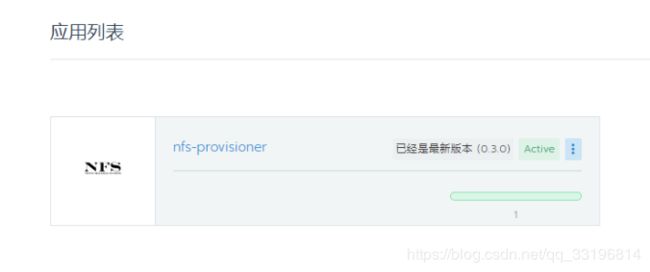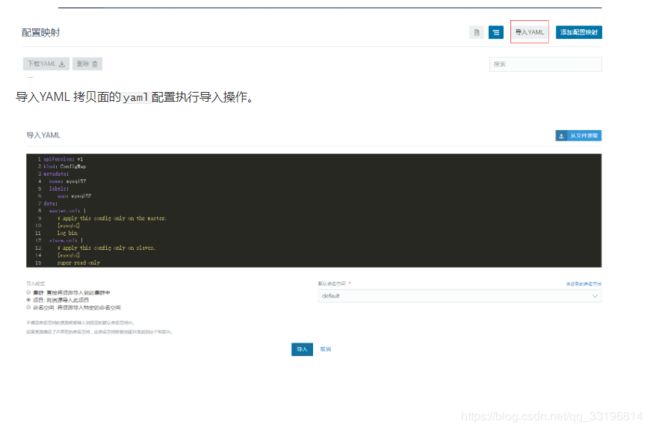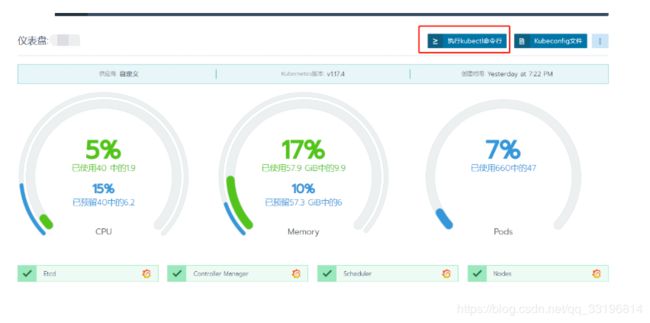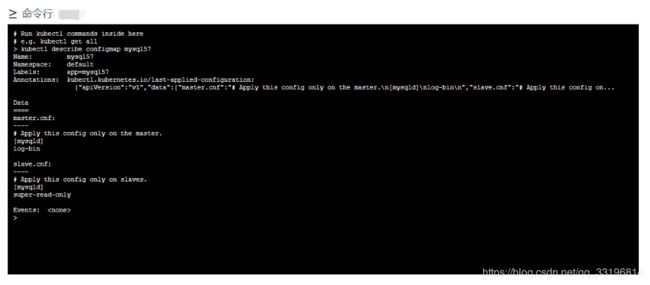使用rancher2.3.6部署mysql集群
作者:lizhonglin
github: https://github.com/Leezhonglin/
blog: https://leezhonglin.github.io
首先需要具备能够提供动态存储的存储类,我这里使用的是应用商店的nfs-provisioner.安装使用默认设置就行.安装好之后就能在启动这个服务的容器机器中有一个 /srv 目录。到时候存储的数据就都在这个文件夹中.
安装NFS

准备的镜像:
gcr.azk8s.cn/google-samples/xtrabackup:1.0
192.169.0.247:5000/dasp/mysql:5.7
gcr.azk8s.cn/google-samples/xtrabackup:1.0这个镜像国内访问不了可以使用dockerhub上面的twoeo/gcr.io-google-samples-xtrabackup:1.0重新tag代替.
1.部署ConfigMap
apiVersion: v1
kind: ConfigMap
metadata:
name: mysql57
labels:
app: mysql57
data:
master.cnf: |
# Apply this config only on the master.
[mysqld]
log-bin
slave.cnf: |
# Apply this config only on slaves.
[mysqld]
super-read-only
通过下图:
kubectl describe configmap mysql57
会看到如下结果:
2.部署Services
service1:
# Headless service for stable DNS entries of StatefulSet members.
apiVersion: v1
kind: Service
metadata:
name: mysql57
labels:
app: mysql57
spec:
ports:
- name: mysql57
port: 3306
clusterIP: None
selector:
app: mysql57
service2:
# Client service for connecting to any MySQL instance for reads.
# For writes, you must instead connect to the master: mysql-0.mysql.
apiVersion: v1
kind: Service
metadata:
name: mysql57-read
labels:
app: mysql57
spec:
ports:
- name: mysql57
port: 3306
selector:
app: mysql57
执行完成后再服务发现里面就能看见刚才添加的两个服务。
同样执行如下命令也是可以查询到的
kubectl get svc | grep mysql57
3.部署StatefulSet
apiVersion: apps/v1
kind: StatefulSet
metadata:
name: mysql57
spec:
selector:
matchLabels:
app: mysql57
serviceName: mysql57
replicas: 3
template:
metadata:
labels:
app: mysql57
spec:
initContainers:
- name: init-mysql57
image: 192.169.0.247:5000/dasp/mysql:5.7
command:
- bash
- "-c"
- |
set -ex
# Generate mysql server-id from pod ordinal index.
[[ `hostname` =~ -([0-9]+)$ ]] || exit 1
ordinal=${BASH_REMATCH[1]}
echo [mysqld] > /mnt/conf.d/server-id.cnf
# Add an offset to avoid reserved server-id=0 value.
echo server-id=$((100 + $ordinal)) >> /mnt/conf.d/server-id.cnf
# Copy appropriate conf.d files from config-map to emptyDir.
if [[ $ordinal -eq 0 ]]; then
cp /mnt/config-map/master.cnf /mnt/conf.d/
else
cp /mnt/config-map/slave.cnf /mnt/conf.d/
fi
volumeMounts:
- name: conf
mountPath: /mnt/conf.d
- name: config-map
mountPath: /mnt/config-map
- name: clone-mysql57
image: gcr.azk8s.cn/google-samples/xtrabackup:1.0
command:
- bash
- "-c"
- |
set -ex
# Skip the clone if data already exists.
[[ -d /var/lib/mysql/mysql ]] && exit 0
# Skip the clone on master (ordinal index 0).
[[ `hostname` =~ -([0-9]+)$ ]] || exit 1
ordinal=${BASH_REMATCH[1]}
[[ $ordinal -eq 0 ]] && exit 0
# Clone data from previous peer.
ncat --recv-only mysql57-$(($ordinal-1)).mysql57 3307 | xbstream -x -C /var/lib/mysql
# Prepare the backup.
xtrabackup --prepare --target-dir=/var/lib/mysql
volumeMounts:
- name: mysql57-data
mountPath: /var/lib/mysql
subPath: mysql
- name: conf
mountPath: /etc/mysql/conf.d
containers:
- name: mysql57
image: 192.169.0.247:5000/dasp/mysql:5.7
#command: ['/bin/bash','-c','docker-entrypoint.sh mysqld']
env:
- name: MYSQL_ALLOW_EMPTY_PASSWORD
value: "1"
ports:
- name: mysql57
containerPort: 3306
- containerPort: 3306
hostPort: 3306
name: 3306tcp33060
protocol: TCP
volumeMounts:
- name: mysql57-data
mountPath: /var/lib/mysql
subPath: mysql
- name: conf
mountPath: /etc/mysql/conf.d
resources:
requests:
cpu: 500m
memory: 1Gi
livenessProbe:
exec:
command: ["mysqladmin", "ping"]
initialDelaySeconds: 30
periodSeconds: 10
timeoutSeconds: 5
readinessProbe:
exec:
# Check we can execute queries over TCP (skip-networking is off).
command: ["mysql", "-h", "127.0.0.1", "-e", "SELECT 1"]
initialDelaySeconds: 5
periodSeconds: 2
timeoutSeconds: 1
- name: xtrabackup
image: gcr.azk8s.cn/google-samples/xtrabackup:1.0
ports:
- name: xtrabackup
containerPort: 3307
command:
- bash
- "-c"
- |
set -ex
cd /var/lib/mysql
# Determine binlog position of cloned data, if any.
if [[ -f xtrabackup_slave_info && "x$(!= "x" ]]; then
# XtraBackup already generated a partial "CHANGE MASTER TO" query
# because we're cloning from an existing slave. (Need to remove the tailing semicolon!)
cat xtrabackup_slave_info | sed -E 's/;$//g' > change_master_to.sql.in
# Ignore xtrabackup_binlog_info in this case (it's useless).
rm -f xtrabackup_slave_info xtrabackup_binlog_info
elif [[ -f xtrabackup_binlog_info ]]; then
# We're cloning directly from master. Parse binlog position.
[[ `cat xtrabackup_binlog_info` =~ ^(.*?)[[:space:]]+(.*?)$ ]] || exit 1
rm -f xtrabackup_binlog_info xtrabackup_slave_info
echo "CHANGE MASTER TO MASTER_LOG_FILE='${BASH_REMATCH[1]}',\
MASTER_LOG_POS=${BASH_REMATCH[2]}" > change_master_to.sql.in
fi
# Check if we need to complete a clone by starting replication.
if [[ -f change_master_to.sql.in ]]; then
echo "Waiting for mysqld to be ready (accepting connections)"
until mysql -h 127.0.0.1 -e "SELECT 1"; do sleep 1; done
echo "Initializing replication from clone position"
mysql -h 127.0.0.1 \
-e "$(, \
MASTER_HOST='mysql57-0.mysql57', \
MASTER_USER='root', \
MASTER_PASSWORD='', \
MASTER_CONNECT_RETRY=10; \
START SLAVE;" || exit 1
# In case of container restart, attempt this at-most-once.
mv change_master_to.sql.in change_master_to.sql.orig
fi
# Start a server to send backups when requested by peers.
exec ncat --listen --keep-open --send-only --max-conns=1 3307 -c \
"xtrabackup --backup --slave-info --stream=xbstream --host=127.0.0.1 --user=root"
volumeMounts:
- name: mysql57-data
mountPath: /var/lib/mysql
subPath: mysql
- name: conf
mountPath: /etc/mysql/conf.d
resources:
requests:
cpu: 100m
memory: 100Mi
volumes:
- name: conf
emptyDir: {}
- name: config-map
configMap:
name: mysql57
volumeClaimTemplates:
- metadata:
name: mysql57-data
spec:
accessModes: ["ReadWriteOnce"]
storageClassName: "nfs-provisioner"
resources:
requests:
storage: 10Gi
volumeClaimTemplates: 要配置成自己的
volumes: 要配置成自己的
4.检查是否完成
kubectl get pods -l app=mysql57 --watch
>kubectl get pods -l app=mysql57 --watch
NAME READY STATUS RESTARTS AGE
mysql57-0 2/2 Running 0 89m
mysql57-1 2/2 Running 0 90m
mysql57-2 2/2 Running 0 91m
至此mysql集群主从复制就在rancher上面部署好了.


